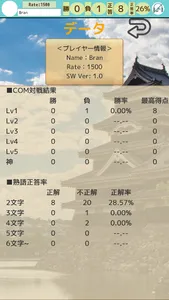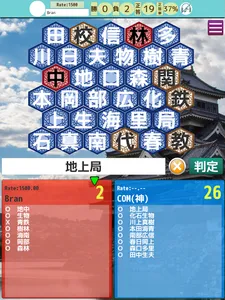At the beginning of the game, 33 kanji characters will be displayed at random.
Two players make two or more idioms from the kanji displayed in order.
The kanji used to make the idiom is your position.
You can overwrite (take away) your position by using the kanji of the opponent's position.
However, you must always use at least one character (unused) kanji that is not in the position for the compound word you make.
The game ends when all the kanji are in either player's position, and the player with the most acquired positions wins.
If the phrase is not registered in the dictionary, the position will remain the same as the opponent's turn.
The dictionary database of wikipedia is used to judge idioms.
Displays a list of idioms created after the game is over. Kanji are randomly selected, so you can't make longer idioms than you think. You may want to choose a short, sure phrase.
Two players make two or more idioms from the kanji displayed in order.
The kanji used to make the idiom is your position.
You can overwrite (take away) your position by using the kanji of the opponent's position.
However, you must always use at least one character (unused) kanji that is not in the position for the compound word you make.
The game ends when all the kanji are in either player's position, and the player with the most acquired positions wins.
If the phrase is not registered in the dictionary, the position will remain the same as the opponent's turn.
The dictionary database of wikipedia is used to judge idioms.
Displays a list of idioms created after the game is over. Kanji are randomly selected, so you can't make longer idioms than you think. You may want to choose a short, sure phrase.
Show More

















